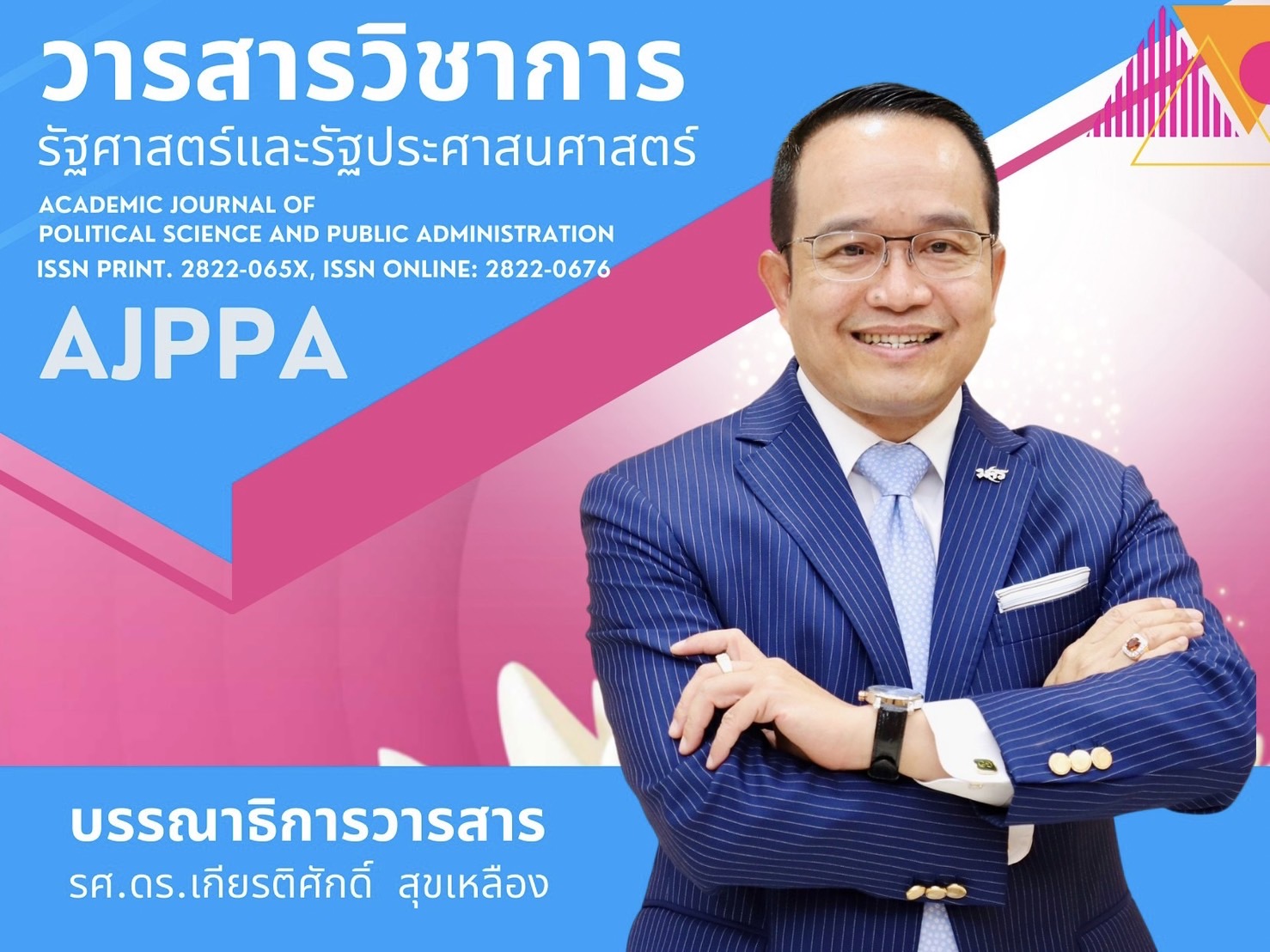องค์กรแห่งการเรียนรู้กลไกสำคัญในการเพิ่มความสามารถ ในการแข่งขันอย่างยั่งยืน
คำสำคัญ:
องค์กรแห่งการเรียนรู้, การแข่งขันอย่างยั่งยืน, นวัตกรรม, วัฒนธรรมองค์กรบทคัดย่อ
ในยุคที่โลกเปลี่ยนแปลงอย่างรวดเร็ว องค์กรแห่งการเรียนรู้ มีบทบาทสำคัญในการช่วยให้บุคลากรและองค์กรสามารถปรับตัวและสร้างนวัตกรรมได้อย่างมีประสิทธิภาพ Peter Senge ได้นำเสนอ วินัย 5 ประการ ที่ช่วยเสริมสร้างองค์กรแห่งการเรียนรู้ ได้แก่ 1. ความรอบรู้แห่งตน (การพัฒนาตนเองอย่างต่อเนื่องเพื่อเพิ่มศักยภาพ) 2. แบบแผนความคิด (เข้าใจสมมติฐานพื้นฐานและเปิดรับมุมมองใหม่) 3. วิสัยทัศน์ร่วม (สร้างเป้าหมายและแรงขับเคลื่อนร่วมกัน) 4. การเรียนรู้เป็นทีม (ส่งเสริมการแลกเปลี่ยนความคิดเห็นและทำงานร่วมกันอย่างมีประสิทธิภาพ) และ 5. การคิดเชิงระบบ (เข้าใจความเชื่อมโยงขององค์ประกอบต่าง ๆ ในองค์กร) ความสามารถในการแข่งขันอย่างยั่งยืน คือการรักษาความได้เปรียบทางธุรกิจในระยะยาว ซึ่งเกิดจากการสร้างคุณค่าให้กับลูกค้า ความยืดหยุ่นในการปรับตัว และนวัตกรรมที่ตอบโจทย์การเปลี่ยนแปลงของตลาด องค์กรแห่งการเรียนรู้ช่วยเสริมสร้างความสามารถนี้ผ่าน 3 กลไกหลัก ได้แก่ 1. การสร้างนวัตกรรมอย่างต่อเนื่อง 2. ความคล่องตัวในการปรับตัวต่อโอกาสและความท้าทาย และ 3. วัฒนธรรมการเรียนรู้ที่ส่งเสริมการทดลองและการแลกเปลี่ยนองค์ความรู้ การสร้างองค์กรแห่งการเรียนรู้ให้ประสบความสำเร็จต้องอาศัยวัฒนธรรมที่เปิดกว้าง ผู้นำที่ส่งเสริมการเรียนรู้ และโครงสร้างองค์กรที่ยืดหยุ่น พร้อมทั้งใช้เครื่องมือ เช่น ชุมชนนักปฏิบัติ และการทบทวนหลัง เพื่อสกัดบทเรียนจากประสบการณ์ ในยุคดิจิทัลองค์กรที่ลงทุนในการเรียนรู้อย่างต่อเนื่องจะสามารถรักษาความสามารถในการแข่งขันและสร้างคุณค่าร่วมกับสังคมได้อย่างยั่งยืน
เอกสารอ้างอิง
กรรนภัทร กันแก้ว และคณะ. (2563). องค์กรแห่งการเรียนรู้กับความท้าทายในการจัดการความรู้ในกระบวนทัศน์การของเปลี่ยนแปลง. วารสารการบริหารนิติบุคคลและนวัตกรรมท้องถิ่น, 6(2), 241-254.
ตลาดหลักทรัพย์แห่งประเทศไทย. (ม.ป.ป.). หลักการและแนวคิดการพัฒนาองค์กรสู่ความยั่งยืน. สืบค้น 10 มีนาคม 2568, https://setsustainability.com/page/sustainability-management-process
บุญฑริกา วงษ์วานิช และกฤษดา เชียรวัฒนสุข. (2565). ผลกระทบเชิงสาเหตุของความสามารถเชิงพลวัตและคุณภาพของระบบสารสนเทศต่อผลการดำเนินงานของบริษัทผู้ประกอบการวิสาหกิจขนาดกลาง และขนาดย่อมในยุคดิจิทัล : การศึกษาตัวแปรคั่นกลางด้านนวัตกรรมผลิตภัณฑ์ กระบวนการ และการตลาด. Journal of Management Science Nakhon Pathom Rajabhat University, 8(2), 422-445.
สวทช. (2557). ชุมชนนักปฏิบัติ (Community of Practice – CoP). สืบค้น 10 มีนาคม 2568, https://www.nstda.or.th/home/knowledge_post/community-of-practice/
อรุณฉัตร คุรุวาณิชย์ และชนันญา น้อยสันเทียะ (2564). ทฤษฎีการเรียนรู้จากประสบการณ์ หรือ Experiential Learning Theory (ELT). สืบค้น 10 มีนาคม 2568, https://www.lifeeducation.in.th/positive-education/
Brightsidepeople. (2564). 6 แนวทางสร้างวัฒนธรรมการเรียนรู้ในองค์กร. สืบค้น 10 มีนาคม 2568, https://brightsidepeople.com
David, A. et al. (2008). Is Yours a Learning Organization? สืบค้น 10 มีนาคม 2568, https://hbr.org/2008/03/is-yours-a-learning-organization
Okmd. (ม.ป.ป.). การจัดการองค์ความรู้ของ SCG. สืบค้น 10 มีนาคม 2568, https://www.okmd.or.th/upload/pdf/chapter3_kc.pdf
Senge, P.M. (2006). The Fifth Discipline: The Art and Practice of the Learning Organization. New York: Doubleday.
Siriroj. (2562). งานจัดการความรู้ คณะแพทยศาสตร์ ศิริราชพยาบาล, นิยามศัพท์ KM การทบทวนหลังปฏิบัติงงาน (After Action Review: AAR). สืบค้น 10 มีนาคม 2568 https://www2.si.mahidol.ac.th/km/knowledgeassets/definition/1975/

ดาวน์โหลด
เผยแพร่แล้ว
รูปแบบการอ้างอิง
ฉบับ
ประเภทบทความ
หมวดหมู่
สัญญาอนุญาต
ลิขสิทธิ์ (c) 2025 วารสารวิชาการรัฐศาสตร์และรัฐประศาสนศาสตร์

อนุญาตภายใต้เงื่อนไข Creative Commons Attribution-NonCommercial-NoDerivatives 4.0 International License.




